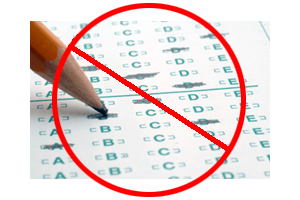Assessment in Game-Based Learning

Assessment in game-based learning (GBL) programs can be far superior to your typical weekly multiple-choice test.
Games are all about constant assessment. Games do not actively “teach” – they don’t say “here is some knowledge for you to remember” – but rather they provide constant challenges and then give you feedback on your decisions, and that is how you learn.
So, in order to better understand how to design effective GBL programs, let’s take a look at some characteristics and considerations of assessment in GBL.
GBL ASSESSMENT CHARACTERISTICS
More formative feedback
“The most valuable assessment for instruction is the continuous, deeply engaged feedback loop of formative assessment” – quote from EdWeek article.
- Games can provide a greater amount and better quality of formative feedback than a traditional classroom. Instead of say, weekly classroom quizzes, games provide constant feedback at the appropriate times in order to keep students in their primary learning zone, thereby leading to better engagement, motivation, and flow.
- Formative assessment in games provide students with a low pressure learning environment that encourages risk-taking and even failing. In a traditional classroom, formative assessment tends to be a higher pressure event in which students need to get it right the first time.
- The greater amount of formative feedback can allow teachers to provide scaffolding support at the appropriate times. For example, DimensionU games provides a daily gameplay log that teachers can review to see what type of support to provide to specific students.
Better assessment than traditional methods
- In games, assessment is integrated with the learning instead of being a separate activity (e.g., quiz) after the learning (e.g., lecture).
- Good educational games can assess 21st century skills, such as critical thinking and creativity, in better and more engaging ways than, say, a grade on an essay paper. For example, in the epistemic game Urban Science, players receive feedback throughout the game on their decisions regarding the urban planning of a city.
- Games can provide more opportunities to assess higher level thinking. For example, Portal 2 presents a number of (physics-related) challenges that require problem-solving skills and creativity in order to pass on to the next level.
GBL ASSESSMENT CONSIDERATIONS
- How is feedback in the game mapped to the learning objectives?
- In a collaborative game, does the game assess both individual and group achievement?
- In a game-like learning environment, such as in the upcoming 3D GameLab classroom system, what are the effects on learning assessment?
Learning Objectives –> Assessment Design –> Game Design
In educational game design, you just can’t start designing the gameplay from the get-go. You need to start with the learning objectives, which means that you have to consider assessment design before jumping into game design (even though the game design is probably more fun!).
So, take some time to understand the various characteristics and differences of GBL assessment, and it will help you to design stronger, more effective GBL programs.
And, please feel free to assess this article in the comments!
Great overview. I think a really important issue is how well modern assessment design principles are adopted by educational game developers looking to assess skills via GBL environments. Other than the increased engagement that most games afford over typical assessment tasks, it would be a shame not to leverage the knowledge of educational measurement and assessment design practitioners to make best use of the rich student-task interaction data that games seamlessly capture. Methods for making meaningful interpretations of these data are important so that performance can be mapped against predetermined learning outcomes and theories of learning and development. I hope educational game developers and assessment/measurement practitioners can keep up the dialogue so that assessment games which better describe and support student learning are produced.
Nathan
May 18, 2011 at 5:09 am
Hi Nathan, thanks very much for your insightful comments.
Because GBL is becoming popular so quickly these days, I think that educators who are jumping into GBL first put their focus on the gameplay rather than assessment.
Maybe this is stage GBL 1.0 (or rather “modern GBL 1.0” since GBL in more “traditional” forms has been around for awhile). GBL 2.0 will probably have to focus on the assessment design practices that you talked about in your comments.
Assessment is not easy, so it will take some good instructional and game designers to come up with fun games with strong assessment abilities.
Thanks again for your comments!
–Randall
randyfuj
May 20, 2011 at 11:44 pm
[…] are all about constant assessment. Games do not actively “teach” – they …Via shoyulearning.wordpress.com Share this:TwitterFacebookLike this:LikeBe the first to like this post. Comments RSS […]
Assessment in Game-Based Learning « cleave21
February 28, 2012 at 5:30 am
[…] Assessment, The Self-Imposed Challenge: Assessment and Games-Based Learning (Aaron Chia-Yuan Hung), Assessment in Game-Based Learning (Shoyu Learning) and Assessment of Games Based Learning (Rowin), have also provided an insight into […]
Games Assessment…Assessment in Games… | Ronan Lynch
October 15, 2012 at 7:11 am
[…] when they might otherwise give up, and educators can adjust what and how they are teaching based onformative assessment about the individual and summative assessment by collective progress of their […]
Impact of Game Based Learning on Education | sasi428
March 16, 2016 at 1:00 am